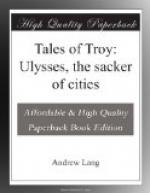When Achilles was asleep that night the ghost of Patroclus came, saying, “Why dost thou not burn and bury me? for the other shadows of dead men suffer me not to come near them, and lonely I wander along the dark dwelling of Hades.” Then Achilles awoke, and he sent men to cut down trees, and make a huge pile of fagots and logs. On this they laid Patroclus, covered with white linen, and then they slew many cattle, and Achilles cut the throats of twelve Trojan prisoners of war, meaning to burn them with Patroclus to do him honour. This was a deed of shame, for Achilles was mad with sorrow and anger for the death of his friend. Then they drenched with wine the great pile of wood, which was thirty yards long and broad, and set fire to it, and the fire blazed all through the night and died down in the morning. They put the white bones of Patroclus in a golden casket, and laid it in the hut of Achilles, who said that, when he died, they must burn his body, and mix the ashes with the ashes of his friend, and build over it a chamber of stone, and cover the chamber with a great hill of earth, and set a pillar of stone above it. This is one of the hills on the plain of Troy, but the pillar has fallen from the tomb, long ago.
Then, as the custom was, Achilles held games—chariot races, foot races, boxing, wrestling, and archery—in honour of Patroclus. Ulysses won the prize for the foot race, and for the wrestling, so now his wound must have been healed.
But Achilles still kept trailing Hector’s dead body each day round the hill that had been raised for the tomb of Patroclus, till the Gods in heaven were angry, and bade Thetis tell her son that he must give back the dead body to Priam, and take ransom for it, and they sent a messenger to Priam to bid him redeem the body of his son. It was terrible for Priam to have to go and humble himself before Achilles, whose hands had been red with the blood of his sons, but he did not disobey the Gods. He opened his chests, and took out twenty-four beautiful embroidered changes of raiment; and he weighed out ten heavy bars, or talents, of gold, and chose a beautiful golden cup, and he called nine of his sons, Paris, and Helenus, and Deiphobus, and the rest, saying, “Go, ye bad sons, my shame; would that Hector lived and all of you were dead!” for sorrow made him angry; “go, and get ready for me a wain, and lay on it these treasures.” So they harnessed mules to the wain, and placed in it the treasures, and, after praying, Priam drove through the night to the hut of Achilles. In he went, when no man looked for him, and kneeled to Achilles, and kissed his terrible death-dealing hands. “Have pity on me, and fear the Gods, and give me back my dead son,” he said, “and remember thine own father. Have pity on me, who have endured to do what no man born has ever done before, to kiss the hands that slew my sons.”




